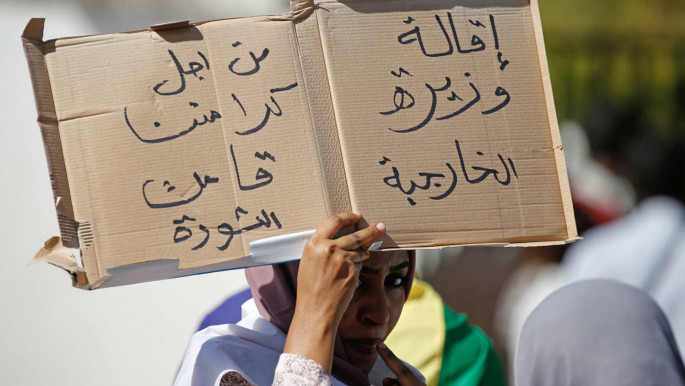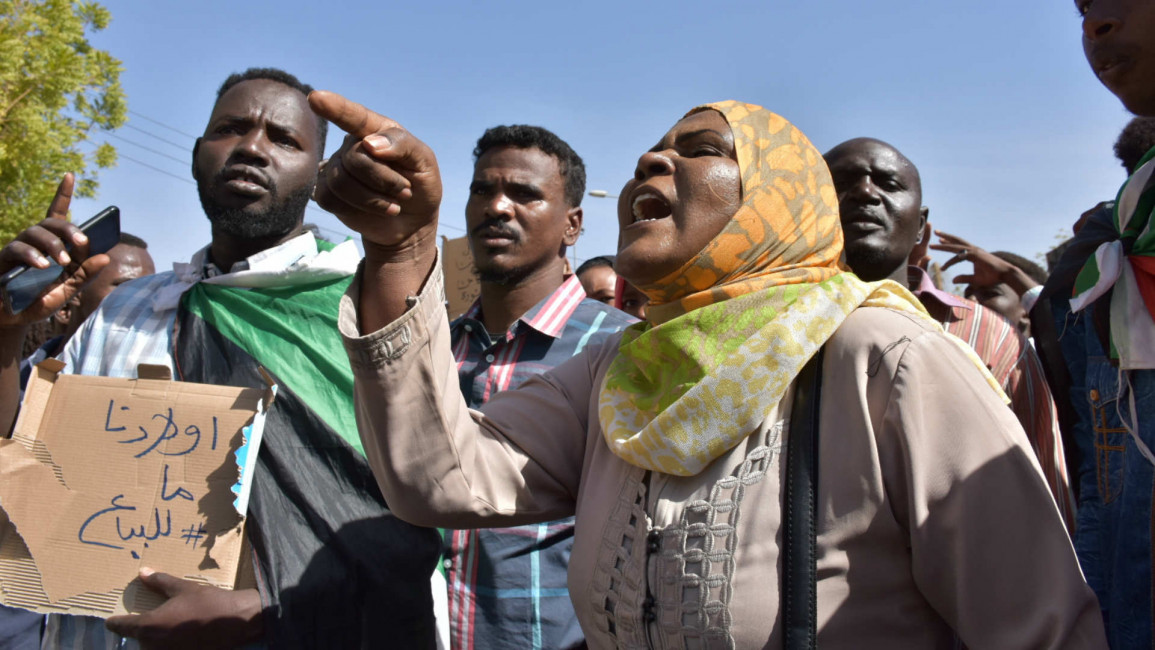Sudan investigating reports of UAE's 'devious' mercenary recruitment for Yemen, Libya wars
Sudan investigating reports of UAE's 'devious' mercenary recruitment for Yemen, Libya wars
Sudanese men recruited to work as security guards in the UAE have allegedly been sent to fight in Libya and Yemen.
4 min read
Some of the recruits are allegedly guarding oil installations in Libya [Getty]
Sudan has launched an investigation into reports of Sudanese men who were lured to work as mercenaries in Libya and Yemen after being hired as guards for an Emirati company.
The foreign ministry said on Tuesday it was looking into the case after some families of the men staged a sit-in outside the ministry building in Khartoum, Reuters reported.
The families have also protested outside the Emirati embassy in Khartoum, which they accuse of green-lighting the recruitment of Sudanese as mercenaries under false pretenses.
Around 50 Sudanese men allegedly recruited and sent to Libya by the Emirati company returned on Tuesday to Khartoum.
They headed directly towards the Emirati embassy to stage a protest, The Sudan Tribune reported.
The allegations came to light earlier this month when a Sudanese man called on the country's transitional government to intervene in the case.
Abdullah Al-Tayeb Yusuf told Al-Jazeera Mubasher that his brother travelled to the UAE after responding to a job advertisement for security guards in the country in October last year.
Upon his arrival in the country, however, Yusuf's brother was allegedly forced into a military training camp alongside around 150 others.
"My brother told me that he was trained in the UAE to handle heavy weapons, and he was given the option to either go to Yemen or Libya after they offered him a large sum of money," Yusuf said.
Sudanese digital media platform Wakeep later shared images of what it claimed were sections of contracts allegedly offered to nationals to work as security guards in the UAE by the Black Shield security company. The contracts make no mention of work in Libya or Yemen.
The documents, which could not be independently verified, appear to have been stamped by the Emirati embassy in Khartoum.
Speaking to Reuters, two protesters said their family members had been transferred to the Ras Lanuf oil terminal in Libya last week, before returning to Sudan after protests began.
Ras Lanuf is one of a number of oil ports blockaded by forces loyal to rogue Libyan general Khalifa Haftar in mid-January, causing crude exports to plunge from about 1.2 million barrels per day (bpd) to less than 300,000 bpd.
Backed by Abu Dhabi, Haftar has led an offensive to capture the capital Tripoli from the internationally-recognised Government of National Accord (GNA) since April last year.
Sudan's foreign ministry said on Tuesday it was investigating the claims alongside Emirati authorities.
"The Ministry of Foreign Affairs and other relevant state institutions affirm their keenness to ensure the safety of Sudanese working for the company and to exert intensive efforts to reassure the families of the citizens concerned," it said in a statement.
A statement attributed to Black Shield, the company allegedly behind the recruitment drive, denied the claims, calling them "misleading".
"The company reserves its right to take any legal and judicial measures against everyone who has offended the company," it said.
How are the UAE and Sudan involved in Yemen and Libya?
Abu Dhabi has been accused of breaking a United Nations arms embargo on Libya to support Haftar and his self-styled Libyan National Army (LNA).
A confidential UN report unveiled in October last year alleged the presence of a thousand Sudanese militiamen in the eastern Libyan city of Benghazi.
According to the report, the Sudanese paramilitaries were sent in July in order to protect oil infrastructure there while the main bulk of Haftar's forces continued their assault on the capital Tripoli.
Sudan has denied the presence of its forces in the conflict, but a December report by The Guardian alleged the growing presence of Sudanese mercenaries fighting for both warring parties in Libya, putting the figure present as at least 3,000.
Leaked documents published by Al-Jazeera last year showed the UAE had gained permission from Khartoum to use Sudan's airspace and ports for the transportation of hundreds of mercenaries fighting in both Libya and Yemen.
The UAE is also a key actor in Yemen, where Abu Dhabi first intervened in 2015 as part of the Saudi-led coalition backing the government of resident Abd Rabbo Mansour Hadi.
Last year, cracks in the Saudi-Emirati alliance showed as the UAE-backed separatist Southern Transitional Council turned on Hadi and seized Aden, leading to weeks of infighting before a truce.
Sudan's transitional government has dramatically downsized the country's troop presence in Yemen this year, but the Sudanese armed forces have fought in the Saudi-led coalition since 2015.
The paramilitary Rapid Support Forces have been accused by rights groups of taking large sums from Saudi Arabia to recruit poor young men - and even children - from Sudan's deprived Darfur region and neighbouring country Chad to serve in Yemen.
Follow us on Twitter and Instagram to stay connected
The foreign ministry said on Tuesday it was looking into the case after some families of the men staged a sit-in outside the ministry building in Khartoum, Reuters reported.
The families have also protested outside the Emirati embassy in Khartoum, which they accuse of green-lighting the recruitment of Sudanese as mercenaries under false pretenses.
Around 50 Sudanese men allegedly recruited and sent to Libya by the Emirati company returned on Tuesday to Khartoum.
They headed directly towards the Emirati embassy to stage a protest, The Sudan Tribune reported.
The allegations came to light earlier this month when a Sudanese man called on the country's transitional government to intervene in the case.
Abdullah Al-Tayeb Yusuf told Al-Jazeera Mubasher that his brother travelled to the UAE after responding to a job advertisement for security guards in the country in October last year.
Upon his arrival in the country, however, Yusuf's brother was allegedly forced into a military training camp alongside around 150 others.
"My brother told me that he was trained in the UAE to handle heavy weapons, and he was given the option to either go to Yemen or Libya after they offered him a large sum of money," Yusuf said.
Sudanese digital media platform Wakeep later shared images of what it claimed were sections of contracts allegedly offered to nationals to work as security guards in the UAE by the Black Shield security company. The contracts make no mention of work in Libya or Yemen.
The documents, which could not be independently verified, appear to have been stamped by the Emirati embassy in Khartoum.
Speaking to Reuters, two protesters said their family members had been transferred to the Ras Lanuf oil terminal in Libya last week, before returning to Sudan after protests began.
Ras Lanuf is one of a number of oil ports blockaded by forces loyal to rogue Libyan general Khalifa Haftar in mid-January, causing crude exports to plunge from about 1.2 million barrels per day (bpd) to less than 300,000 bpd.
Backed by Abu Dhabi, Haftar has led an offensive to capture the capital Tripoli from the internationally-recognised Government of National Accord (GNA) since April last year.
 |
| A Sudanese woman calls for the foreign minister's resignation over the reports [Getty] |
Sudan's foreign ministry said on Tuesday it was investigating the claims alongside Emirati authorities.
"The Ministry of Foreign Affairs and other relevant state institutions affirm their keenness to ensure the safety of Sudanese working for the company and to exert intensive efforts to reassure the families of the citizens concerned," it said in a statement.
A statement attributed to Black Shield, the company allegedly behind the recruitment drive, denied the claims, calling them "misleading".
"The company reserves its right to take any legal and judicial measures against everyone who has offended the company," it said.
How are the UAE and Sudan involved in Yemen and Libya?
Abu Dhabi has been accused of breaking a United Nations arms embargo on Libya to support Haftar and his self-styled Libyan National Army (LNA).
A confidential UN report unveiled in October last year alleged the presence of a thousand Sudanese militiamen in the eastern Libyan city of Benghazi.
According to the report, the Sudanese paramilitaries were sent in July in order to protect oil infrastructure there while the main bulk of Haftar's forces continued their assault on the capital Tripoli.
Sudan has denied the presence of its forces in the conflict, but a December report by The Guardian alleged the growing presence of Sudanese mercenaries fighting for both warring parties in Libya, putting the figure present as at least 3,000.
Leaked documents published by Al-Jazeera last year showed the UAE had gained permission from Khartoum to use Sudan's airspace and ports for the transportation of hundreds of mercenaries fighting in both Libya and Yemen.
The UAE is also a key actor in Yemen, where Abu Dhabi first intervened in 2015 as part of the Saudi-led coalition backing the government of resident Abd Rabbo Mansour Hadi.
Last year, cracks in the Saudi-Emirati alliance showed as the UAE-backed separatist Southern Transitional Council turned on Hadi and seized Aden, leading to weeks of infighting before a truce.
Sudan's transitional government has dramatically downsized the country's troop presence in Yemen this year, but the Sudanese armed forces have fought in the Saudi-led coalition since 2015.
The paramilitary Rapid Support Forces have been accused by rights groups of taking large sums from Saudi Arabia to recruit poor young men - and even children - from Sudan's deprived Darfur region and neighbouring country Chad to serve in Yemen.
Follow us on Twitter and Instagram to stay connected



